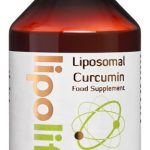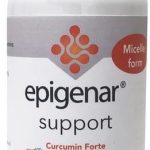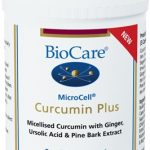Turmeric. That’s that exotic yellowy-orange spice that pops up a lot in Indian cooking, right? Yes, indeed; but if you thought all turmeric’s good for is to flavour a curry then you’re in for a surprise. For, thanks to one of the nutrients it contains, namely curcumin, this humble spice offers a dazzling array of health benefits for the body. So much so there’s a very good chance you’ll be aiming to incorporate it into your everyday diet far more often from this point on.
Curcumin is a diarylheptanoid chemical and, within turmeric, is responsible for the spice’s vibrant pigmentation. More pertinently, though, when consumed, digested and properly absorbed into our bodies it actively seeks to provide therapeutic assistance in a wide range of ways – that is, everything from acting as an antioxidant to aiding wound healing and everything from soothing irritated tissue to maintaining good function of the cardiovascular, gastrointestinal and immune systems1.
Curcumin benefits
In greater detail then, curcumin’s many health-friendly benefits include:
- Antioxidant properties – thanks to the fact it’s an antioxidant, curcumin is an effective combater of oxidative stress (which sees harmful ‘free radicals’ roam about the body causing problems by seeking out various molecules with which to ‘pair off’); so, as an antioxidant compound, curcumin inhibits the success of these free radicals, enabling the body to heal itself of any damage done naturally. Indeed, research suggests that curcumin’s antioxidant potential is at least 10 times greater than that of resveratrol, the often talked-about antioxidant present in red wine – moreover, it appears curcumin even enhances other antioxidants’ positive contributions in the body1.
- Aids the cardiovascular system – in actual fact, it’s also thanks to curcumin’s antioxidant properties that the cardiovascular system benefits from the nutrient, as – in combating the hazardous toxicity that some particularly aggressive, if necessary medical treatments expose to the body – it helps to support normal and healthy functioning of the heart2
- Good for gastrointestinal health – not only does curcumin promote normal, healthy gallbladder function and the flow of bile (which is critical for the digestion of fats), it’s been found through studies that it plays an important role in supporting the health of stomach cells1
- Promotes liver health – recent research highlights curcumin’s efficacy for protecting the liver from several different toxins and promoting regular functioning of this organ3; indeed, the latest studies in the area indicate it may also be able to address fatty liver disease4
- Fights fungi – curcumin is also effective in preventing the body from being harmed by unwanted organisms; for instance, different kinds of fungi1, 5 – in vitro testing has discovered that turmeric extracts (containing curcumin, obviously) can prevent such organisms from growing and making the digestive system their home, where they go on to wreak havoc1
- Soothes swollen tissue – it appears curcumin is also capable of soothing irritation to tissue caused by swelling; moreover, by consuming the chemical – within turmeric or via supplementation – on a daily basis, so many studies attest, tenderness, stiffness and joint-swelling can be reduced1
- Helping to heal wounds – finally, research suggests that both wound repair and the natural production of skin cells are successfully encouraged by the presence of curcumin in the body – in fact, whether the chemical’s applied to the wound itself or consumed orally seems to make no difference in terms of efficacy1
Bioavailability and nanocurcumin
So, the above surely makes it abundantly clear that curcumin is incredibly nutritious and useful for the human body. And it undeniably is, yet it may too come with a drawback – its bioavailability. What does this mean? It’s a term that refers to how ‘available’ to different parts of the body that needs its goodness a specific nutrient is; in other words, how effectively all of a nutrient’s goodness is absorbed once it’s digested, broken down and transported around the body.
And, like it or not, the bioavailability levels of curcumin unfortunately aren’t as high as they might be. However, that’s not to diminish the fact that it’s a very beneficial nutrient. Moreover, work is presently taking place to find ways to improve its bioavailability. For instance, one line of research is looking into nanocurcumin, a form of the chemical in which its particles are contained in a kind of emulsion.
The thinking with nanocurcumin is that the bioavailability – the absorption – should be improved because (on a microscopic scale) this curcumin compound features a larger surface area, which means its physical stability is improved, thus requiring less energy on the digestive system’s part to break it down and process it6. And, away from nanocurcumin, research also shows that, by adding to the nutrient alkaloid piperine (which features in black pepper), ordinary curcumin’s bioavailability soars by up to 2,000%7. Something to think about!
Supplementation
Fair enough, it could be that you might struggle to work turmeric into your diet on a daily basis (possibly you might find it a little monotonous?), so you may be on lookout for another way to get your regular fill of curcumin. Naturally-derived supplements then are undoubtedly the answer here – the following curcumin supplements are all highly recommended and available through us at The Finchley Clinic:
Curcumin (Liposomal liquid) – this supplement’s unique and dynamic liposomal process (involving nano-particle technology) overcomes curcumin’s absorption issues, ensuring the supremely beneficial and entirely natural nutrient is effectively delivery throughout the body at the cellular level.
Curcumin Forte – offering curcumin in micellar form (thus boosting its availability to at least, if not in excess of, that achieved via the liposomal process), this supplementary curcumin is both water- and fat-soluble, as well as pH stable, and 185 times more absorbable than standard forms of the nutrient.
Curcumin Plus – a supplement that presents the nutrient in micellised form for maximum efficacy, along with additional naturally-derived antioxidants from the likes of pine bark, ursolic acid, sage and ginger.
References:
1. Braun L. and Cohen M. ‘Herbs and Natural Supplements: An Evidence-Based Guide: Volume 2.’ Australia, Churchill Livingstone. Nov 2014.
2. Wongcharoen W. and Phrommintikul A. ‘The Protective Role of Curcumin in Cardiovascular Diseases’. International Journal of Cardiology., vol. 133, no. 2, 24, Feb 2009, pp. 145–51.
3. Rivera-Espinoza Y. and Muriel P. ‘Pharmacological Actions of Curcumin in Liver Diseases or Damage’. Liver International, vol. 29, no. 10, Nov 2009, pp. 1457–1466.
4. Kuo J.J. et al. ‘Positive Effect of Curcumin on Inflammation and Mitochondrial Dysfunction in Obese Mice with Liver Steatosis’. International Journal of Molecular Medicine, vol. 30, no. 3, July 2012, pp. 673–9.
5. Wang Y. et al. ‘Study on the Antibiotic Activity of Microcapsule Curcumin Against Foodborne Pathogens’. International Journal of Food Microbiology., vol. 136, no. 1, Sept 2009, pp. 71–4.
6. Jaiswal M., Dudhe R. and Sharma P. K. ‘Nanoemulsion: An Advanced Mode of Drug Delivery System’. 3 Biotech 5.2 (2015): 123-127.
7. Shoba G., et al. ‘Influence of Piperine on the Pharmacokinetics of Curcumin in Animals and Human Volunteers’. Planta Medica., vol. 64, no. 4, June 1998, pp. 353–6.



